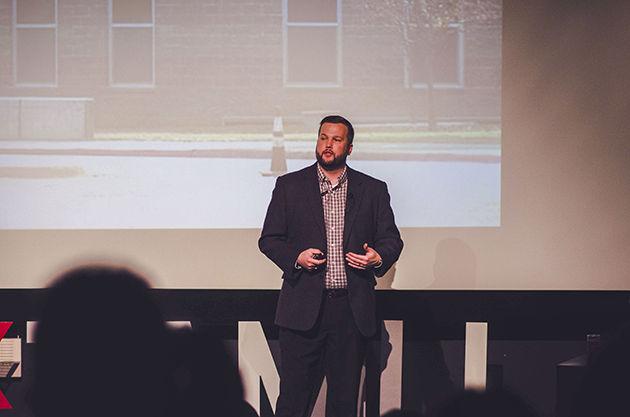Last Saturday, A&M hosted a conference to hear profound ideas to approach a number of society’s challenges.
TEDxTAMU is a conference devoted to bringing ideas worth spreading to Texas A&M University and the surrounding community. The conference consisted of two four-hour sessions Saturday where a slate of professors and scientists explained their approaches towards solving growing issues in society. Each speaker spoke about a range of topics from technology, leadership and creative arts.
The first speaker Saturday morning was James Behnam, Chief Executive Officer of JB Knowledge and construction science professor. JB Knowledge is a premier provider of technology solutions to the construction and insurance industries across the world. Benham said the integration of construction and computers is rewriting the rules of the built world of construction.
“Construction science and computer science are fundamentally converging,” Benham said. “Historically we’ve looked at these as being mutually exclusive but now they are fundamentally intertwined with each other.”
One area of interest is virtual reality — a 3D computerized simulation of an environment that allows human interaction. Benham said he is interested in using virtual reality so builders can review what they are going to build before they build it to prevent mistakes.
“Virtual reality is the pursuit of presence and mobility,” Benham said. “There are a lot of problems and things that you don’t really find out until you start building. We started to identify what physically wasn’t going to work and use our hands inside virtual reality to peel wall layers away and to review how it’s built.”
Benham said experience and feeling allows for better models and ultimately improve safety and lower the cost of buildings. Benham also said this technology will fundamentally change the way buildings are constructed.
“If you don’t know the built environment, this is revolutionary technology,” Benham said. “The ability to not have to pull a tape measure and a piece of string out to figure out how big a piece of space is or what you are going to do with it. 3D scanning, computer vision and drones deliver so much for us in the built environment.”
Another professor to speak at the event was Jeffery Tomberlin, an associate professor in the entomology department, who researches insects as a method for nutrient recycling. Tomberlin said that the world is running into a population overgrowth problem that will lead to more issues including malnutrition and human waste.
“By the year 2050, we should be close to 10 billion people,” Tomberlin said. “We need to figure a solution on how to feed this many people. We waste about 55 million tons of food annually — 40% of our food supply and food waste is responsible for 125 million tons of Greenhouse gases annually.”
On the other end of the spectrum, finding a way to deal with human waste is another rising problem in the world. Tomberlin said his solution to both issues will complete two steps — increase the sustainability of world fish production and decrease organic waste entering landfills.
“The answers are insects — specifically the insect of interest is the Black Soldier Fly,” Tomberlin said. “You can feed them a lot of food to produce protein. The reason we think insects are a viable option is because many fish we grow in the aquaculture industry rely on insects for a natural diet so it’s an easy transition.”
Tomberlin has been performing research for eight years to test the types of manure to feed these insects. He said his team has found they can change the nutrient value of the larvae produced in the waste and select larvae for certain features and we can design insects for specific commodities.
“The real epiphany came when we did research in 2013 when we did research on food waste,” Tomberlin said. “We found we can feed the insects food waste and they can digest the food into protein and fat as well.”
The end product of protein and fat can be a food source for other animals — potentially in aquaculture. With every proposal there are a few hurdles that must be addressed before it can become a reality. Tomberlin said he must make sure what we are producing is safe and current FDA laws must change to allow use of insects as food for livestock.
“We must develop better waste management practices that address multiple global issues,” Tomberlin said. “I believe the that Black Soldier Fly could serve one aspect of this and that is we can produce a viable protein through waste that has value today and potentially create new foods to feed the world.”
Professors share solutions to societal problems
April 17, 2016
Photo by PROVIDED
Kevin Andrews from Tedx TAMU presents his Ted talk about lesson that can be taught through the study of beer.
0
Donate to The Battalion
$2165
$5000
Contributed
Our Goal
Your donation will support the student journalists of Texas A&M University - College Station. Your contribution will allow us to purchase equipment and cover our annual website hosting costs, in addition to paying freelance staffers for their work, travel costs for coverage and more!










